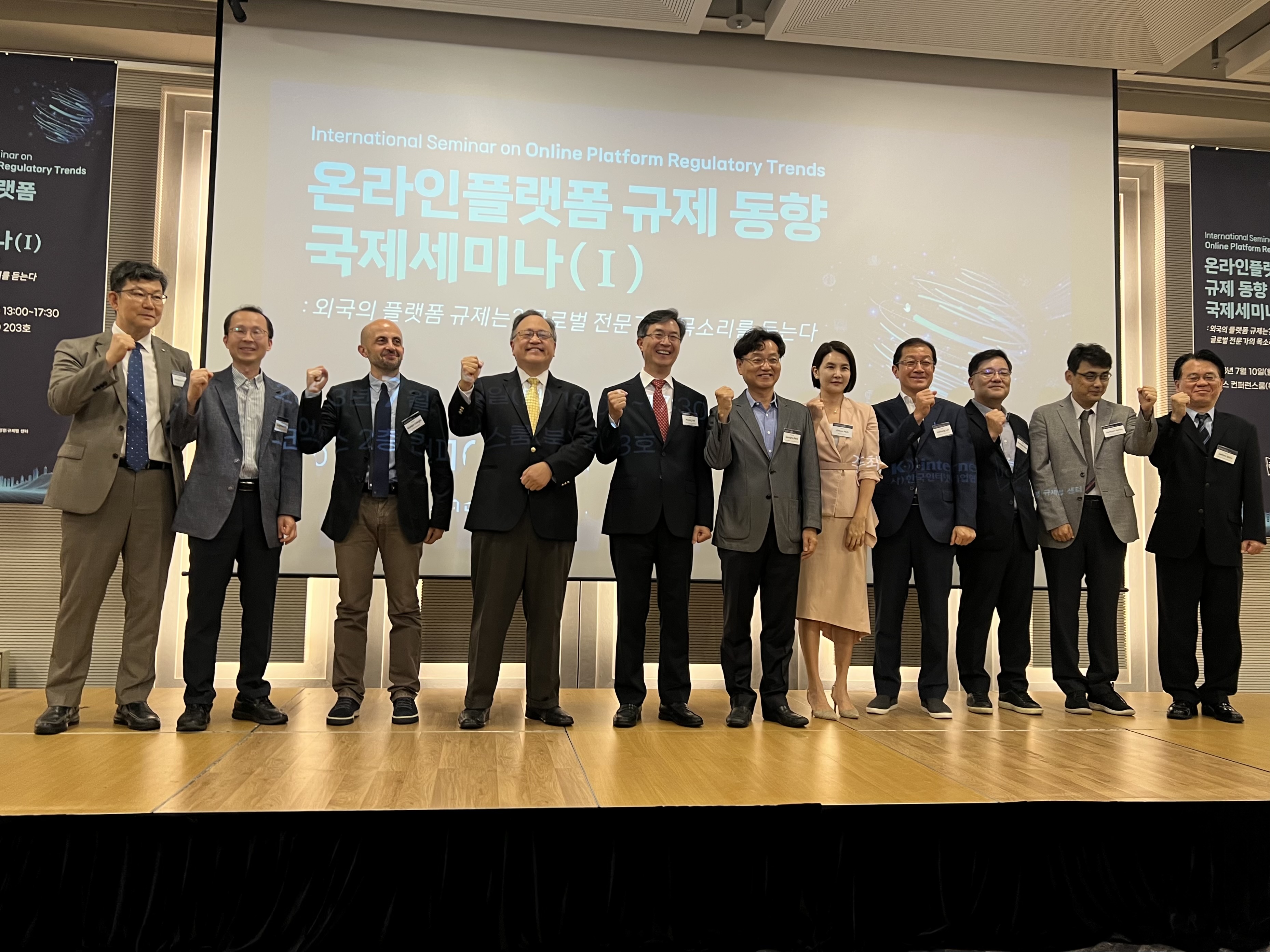
The “International Seminar on Online Platform Regulatory Trends (I)” was held on July 10 at COEX Conference Room (North) 203, hosted by the Korea Internet Companies Association and Korea University ICR Center.
The seminar consisted of two sessions with presentations by international speakers and discussions by local experts.
In the first session, Professor Christopher Yoo (University of Pennsylvania Law School) presented “Shifting Tones in Platform Regulations in the U.S.,” explaining the recent changes in the U.S. Congress’ attitude toward platform companies. “In 22 years, only one out of six platform bills introduced has passed the House of Representatives, and even that did not make it to a cloture vote in the Senate,” he said.
Professor Christopher Yoo (University of Pennsylvania Law School), referring to the current behavior of governments targeting platforms, said, “Given that past telecommunications regulation has been structurally separate to the detriment of consumers, it is questionable whether lawmakers have considered past experience.” “Even in the U.S., the Supreme Court has said in the past that we should be cautious about pre-regulation, so we should be cautious about pre-regulating before we have a good understanding of the industry,” he added.
The second presentation, “Regulating Digital Gatekeepers in the EU: DMA, Antitrust, and Platform Economics,” by Prof. Giuseppe Colangelo (University of Basilicata), discussed the limitations of DMAs in the EU. “DMA-style ex ante regulation of digital platforms is likely to have unintended side effects and hinder industrial innovation,” said Prof. Giuseppe Colangelo. “The EU prides itself on being a leader in digital market regulation through the DMA, but even within Europe it is questionable whether it is effective due to conflicts with national antitrust rules in countries such as Germany and Italy, which can lead to confusion.” “The DMA should not be copied by other countries as it is neither applicable in the EU nor a global standard,” he said.
The third presentation, “Law and Policy for Online Platform Competition: The Experience of Taiwan,” was given by Mr. Andy Chen, Vice Chairman of the Taiwan Fair Trade Commission, who explained how Taiwan currently views the platform industry. “Taiwan’s competition authorities do not take a proactive approach to the issue of monopolization by platform companies, and take a case-by-case approach to each issue,” said Andy Chen. He also said, “Taiwan does not regulate digital platforms through a separate law, and cautious ex ante regulation has failed in Taiwan.”
“Many of the recent legislative changes in the EU have been targeted,” he said, noting that “it’s not a good idea to change laws or regulations just because we think something needs to be changed.” “Instead of following a particular country’s regulatory model, we need to tailor our responses to each country’s circumstances.”
The fourth speaker, Robert D. Atkinson, President of the Information Technology & Innovation Foundation (ITIF), presented “The Case Against Ex-Ante Internet Platform Regulations. Mr. Atkinson argued that DMAs stifle market competition and platform innovation. “Instead of over-regulating, we need to look at each platform on a case-by-case basis and specifically assess whether it is anti-competitive,” he said, adding that European regulation is expected to harm hundreds of thousands of companies that benefit from the services and products of “gatekeepers” and cause significant contraction. “It would not be too late for Europe to wait 24 months after implementing the DMA to see how it affects consumers, business innovation, etc. before thinking about implementing it in Korea,” he said.

In the second session discussion, Prof. Namhoon Kown (Konkun University) said, “While there is talk about the need for regulation as platforms grow, there is no evidence of price increase or quality decrease after the emergence of platforms,” adding, “By global standards, Korea is the only country in the world where there are significant competing suppliers.
Prof. Jae-Han Shim (Yeungnam University) said, “Competitor absorption mergers have been used as so-called ‘killer mergers’ to eliminate new competitors in the patent-based pharmaceutical market, but unlike the pharmaceutical industry, merger issues in the IT sector can have a positive outcome by creating new markets.” “There is also the benefit of creating a new ecosystem if the merged company exits successfully,” he said.
Professor Jaehyun Nam (Korea University) said, “Market definition requires establishing clear standards through various surveys, such as identifying who the competitors are, but the platform ecosystem is a very difficult area for market definition.” “In Korea, there hasn’t even been a survey to establish standards, and I think it’s a big problem to generalize the standards that have been roughly prepared in advance and make them law.”
“Lawyer Nam-geun Kim, chairman of the Policy Advisory Board of People’s Solidarity for Participatory Democracy, said, “We need to take a balanced look at all situations where monopolies stifle innovation or where sustainable innovation is stopped.
Prof. Sunghwan Kim (Ajou University) argued that “even if the European DMA is well-designed, it should not be applied to Korea because the market competition conditions are different”. “There are no studies that have analyzed the competitive situation of the online shopping market by the government or research institutes,” he said. “It makes no sense for the government to apply the DMA without citing stock market data or professionally analyzing the competitive situation of the market.”
The final panelist, Jiyeon Park, an attorney at BAE, KIM & LEE LLC (BKL), said, “Applying the DMA Act’s pre-regulation to Korea will actually hinder innovation in the digital market.” “While overseas countries choose their regulatory approaches according to their own circumstances, we should avoid hastily introducing regulations that may only target domestic platform companies and cause them to lose their competitiveness.”
In his opening remarks, Seongho Park, president of the Korea Internet Companies Association, which organized the seminar, emphasized that “the government should create an environment where companies can actively provide services by boldly removing regulations that are not in line with global trends.

![[BLT칼럼] 아이온큐가 특허로 '기술 신뢰도'를 쌓은 법 : 양자컴퓨팅 시대, IP 전략 제시 8ee48ae3a3a11](https://platum.kr/wp-content/uploads/2025/10/8ee48ae3a3a11-150x150.png)




Leave a Comment